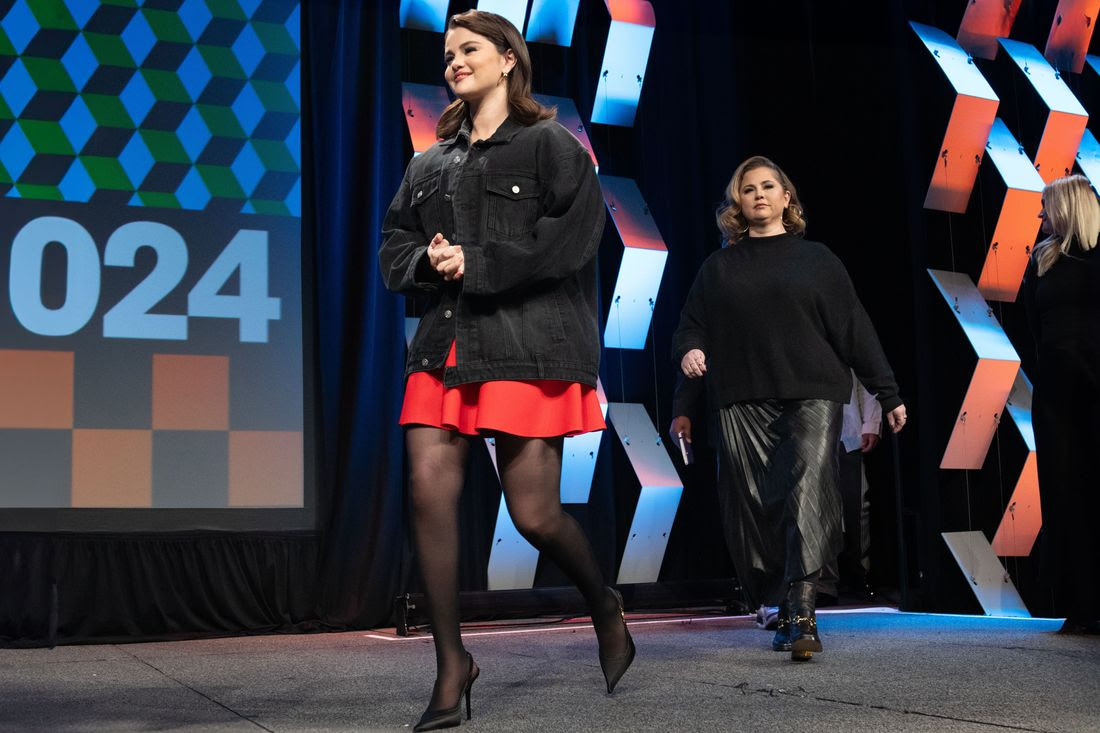By ieyenews
Copyright ieyenews

By Angelina Chapin
A features writer for The Cut who covers gender, crime, and culture.
On a Thursday night in late September 2023, at close to 11:30, Mandy Teefey, the CEO of mental-health start-up Wondermind, sent a startling series of texts to a group of her employees. Teefey, then 47, had co-founded the company almost two years before with her famous daughter, the actress and pop star Selena Gomez, and a young entrepreneur named Daniella Pierson. The texts were muddled by typos, but the recipients were able to deduce that Teefey was in the L.A. office, a small suite above an art gallery at the corner of Melrose and Harper Avenues in West Hollywood, where she sometimes slept, and that she believed she’d seen an intruder on the security footage. The first sentence was especially difficult to make out: “There is someone drilling on the day, and the told me to go to sleep on a whisper through the ring. I’ve called the cops but I’m scared.” An employee replied, alarmed, “OMG???” Teefey wrote back, “I’m fucking shaking. I answered him and said I’m not going anywhere. And he said neither was he.” The employee checked the office’s Ring cam remotely and said she didn’t see anyone. Teefey responded, “I’m watching footage, and I can hear him rustling under.” Another staffer, who lived nearby, drove to the building and found an LAPD cruiser parked outside. (This employee declined to comment.) When the staffer called Teefey from the lot, she thanked him for coming and said, without any explanation, that he could go home. The police made no arrests and noted in their report that there was “no evidence of trespass” at the building.
Teefey did not write again to the group thread that night, and she did not address the incident when they returned to work the next day. Some staff were rattled, but they weren’t exactly shocked. Employees at Wondermind had come to expect erratic behavior from their boss, like disappearances that lasted days or even weeks and unpredictable angry outbursts. Since the company was launched a year and a half before, Teefey had gone through phases of sleeping in her office, where she had two couches. She seemed to stay for days without bathing — there was no shower in the suite — and sometimes without changing her clothes.
Early on, Teefey had explained her overnights by saying she was too busy to drive the 20 miles back to her home in Woodland Hills, where she lives with her husband and preteen daughter. But according to former staffers, Teefey treated the office like her “refuge” from the world and her homelife, where she could do whatever she wanted. Through the glass walls of her office, employees saw her watching Schitt’s Creek on a flat-screen TV for hours at a time in the middle of the workday, surrounded by takeout boxes and packages from luxury brands. She often ordered delivery food multiple times a day — McDonald’s, Krispy Kreme, Chinese food — and several staffers say the boxes tended to accumulate, gathering flies. At one point, her parcels of designer goods nearly filled a nearby room. “It wasn’t ‘Oh, I spent $500 on Amazon,’” one former staffer explains. “This would be, like, $40,000 from Neiman Marcus.”
Some employees say the scene was more grim. They believe that Teefey was sometimes intoxicated. One calls Teefey’s office her “drug den.” Accounts of what she allegedly used vary. One staff member recalls being in her office when she snorted what they believe was a line of Ritalin.
A rotation of nurses regularly came by to give Teefey vitamin IV drips — not so uncommon for a wealthy Angeleno. But often, toward the end of the workday, a second nurse would arrive, employees say, one who was “missing some teeth and a little bit erratic.” People present heard both Teefey and the nurse say that Teefey was receiving liquid Benadryl, typically administered in medical settings to treat severe allergic reactions. While concierge clinics commonly offer IV drips that include the antihistamine for seasonal allergies or migraines, the frequency of use was unusual. The drug can be used as a downer, and in high doses it can cause hallucinations and delirium. Teefey told former staffers she needed the injections to deal with allergies and the aftermath of severe COVID and double pneumonia in late 2021, which she described as a near-death experience. Employees say that after the injections, Teefey spoke slowly and seemed drowsy. (Occasionally, Teefey’s younger daughter came to the office for sleepovers, which worried employees.) To some with knowledge of what happened that September night, the Benadryl helped explain Teefey’s actions: The “man” she claimed had entered the building seemed to them to be an illusion.
Wondermind was supposed to build a world of mental-health-related content — through a website, podcasts, TV shows, and films — and its mission was lofty: to “destigmatize” mental-health problems and “democratize” its care. The project seemed fitting for Gomez, who has made mental-health advocacy an explicit part of her public identity. In 2020, she revealed on an Instagram Live that she is bipolar, describing the diagnosis as a type of gift: Embracing the truth had “empowered” her. During Wondermind’s first year, she starred in a documentary, Selena Gomez: My Mind & Me, intended to offer a behind-the-curtain view of her struggle with her mental health and the effects of her chronic autoimmune disease, lupus. Ahead of the film’s release, Gomez told Rolling Stone she’d been checked into mental-health treatment facilities four times. She described her anxiety about sharing her story but said it was the right thing to do. “Because I have the platform I have,” she said, “it’s kind of like I’m sacrificing myself a little bit for a greater purpose.”
Something to the opposite effect seems to have played out at Wondermind. Out of 29 former and current employees, 14 agreed to speak with me, most on the condition of anonymity. According to dozens of conversations, the company’s grand mission and basic operations were tanked by Gomez’s and Teefey’s personal and family dysfunction, including the denial of Teefey’s instability.
In March, Wondermind failed to pay employees on time. In May, after paychecks failed to go out on schedule once again, and the debacle leaked to the press, staffers were furious but not surprised.
“I will say this with the utmost certainty — no doubt, hesitation in my mind,” one says. “Selena knew her mother was not well enough to be running that company.”



